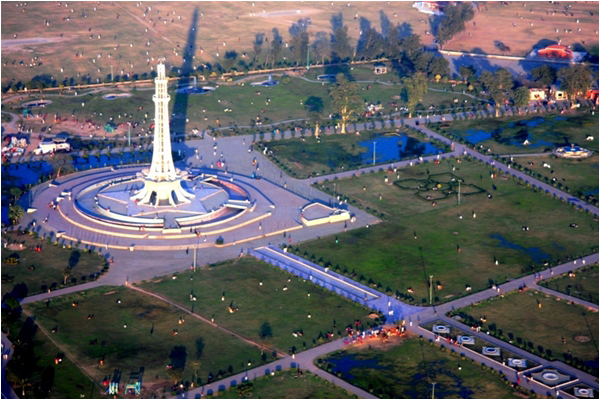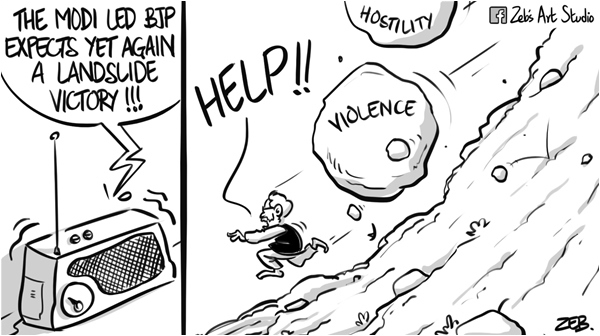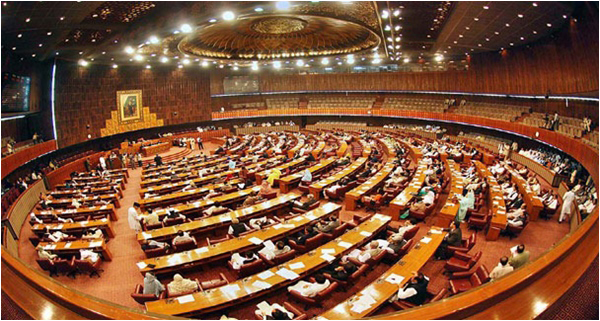
Ground forces needed
Sir,
ISIS has again proved that it can strike beyond Iraq, with the so-called soldiers of the caliphate having recently demonstrated a chilling reach. The seemingly synchronised assaults that turned Paris into a warzone came just days after an attack in a Shia district of Beirut, controlled by Iran’s ally, Hezbollah, and let us not forget a Russian passenger jet was downed over Egypt’s Sinai Peninsula. The rapid succession of strikes, all claimed by ISIS, suggested that the regional war is taking a global shape. The skill and determination of IS leaders and fighters, its organisational size and its demonstrated lethality distinguish it from other terrorist groups. So the potential global threat posed by ISIS will be different and very high in magnitude than the one that was once posed by al-Qaeda.
Despite thousands of US airstrikes in Iraq and Syria that are reported to have killed about 10,000 ISIS fighters, the group continues to replenish its forces. Intelligence analysts have estimated that almost 30,000 foreign militants from more than 100 countries have entered Iraq and Syria since 2011, with ISIS gaining about 1,000 fighters a month. A very important component is missing in all this anti-IS strategy, which is the absence of any effective ground forces against the terrorist outfit. No amount of airstrikes can ever fully obliterated the hated group because even significantly extensive air campaigns will still leave enough of a residual force, leadership, and safe havens, to allow ISIS to reconstitute and reorganise itself. American forces have been bombing ISIS targets for more than a year without significant progress. Russia has now also joined these efforts, but has thus far been unable to seriously degrade the capability of those violent fanatics. It was argued that the US air campaign was aimed at “containing” ISIS and its expansion. But a strategy that only disrupts or contains without defeating or destroying ISIS has no prospects of a successful outcome.
ISIS is a serious enemy with significant skills as a light infantry. Aerial bombing is a conventional modern counter-state strategy. It is the least efficient and least decisive strategy, even more so against ISIS in 2015 than against Germany in 1945. ISIS is not dependent on heavy industry or urban infrastructure, which if targeted by the bombing will affect its fighting capabilities. Air strikes alone are indecisive without a ground campaign to flush the terrorists/insurgents out of their hiding places. There is a need for an integrated strategy, including an air campaign and commitment of ground troops. It’s being long argued that local militias or groups, which oppose ISIS, can be used on the ground against the terrorist group. But it’s a hard fact that no group has the strength to take on ISIS in direct confrontation. Even Kurdish militia’s like the PKK and YPG, who have had battlefield success against ISIS in a limited arena, are unwilling to battle it on a large scale and on multiple fronts. Kurdish militias have a uni-focal approach to safeguard their strongholds from ISIS and consolidate their positions.
To defeat the Islamic State and contain ISIS fighters, a ground campaign needs to be led by first-tier Western armies, one that is of a scale equivalent to the invasion of Iraq in 2003, and would need the cooperation of Iraq’s and Syria’s neighbours, so that Iraq’s and Syria’s borders can be closed, otherwise ISIS fighters will escape to other states. This cooperation will need to include not just Western “allies”, the Kurds and Turkey, but at least tacit cooperation from Western “enemies” Syria, Iran and Russia.
Manish Rai,
New Delhi.

Should remain ready
Sir,
An earthquake measuring 8.1 on the Richter scale hit the northern parts of the country around 20 days ago. As reported by the media, besides Lahore, tremors of the October 26 earthquake were also felt in Islamabad, Gujranwala, Sialkot and other Punjab regions. Dubai, India and Afghanistan too were jolted by the quake. Needless to say, the high intensity of the tremors generated by the quake sent shivers down the spines of fear-stricken people who were seen rushing out of their abodes. Everyone being deeply concerned about the welfare of their near and dear ones frantically tried to get in touch with them. But to their utter dismay, the quake temporarily affected the country’s telecommunication network.
It has been reported that the epicentre of the quake was in the Hindukush mountain range and it was 193km underground. Experts say the October 26/15 earthquake is the severest in the country’s history. It is said that over 270 people were killed, hundreds injured and thousands rendered homeless by this earthquake. If one remembers, the 2005 quake that devastated the northern parts of the country was of a magnitude of 7.6. It caused massive destruction and about 100,000 innocent men, women and children lost their lives.
In its endeavours to set forth stringent policies vis-à-vis construction of particularly high-rise buildings in the earthquake-prone northern regions of the country, particularly Islamabad, the government must direct the Capital Development Authority (CDA) and similar civic bodies in other quake-affected regions to immediately form an experts panel of professionally qualified and highly experienced structural engineers to make a thorough assessment of the extent of damage the recent earthquake has done, particularly to high-rise buildings in the capital. This is extremely essential if a catastrophe of greater magnitude is to be avoided in future. Equally important is the issue of quick rehabilitation of the people who were badly affected by the quake. The government must immediately activate the government agencies concerned to urgently undertake rehabilitation work in the affected regions.
Fazal Elahi,
Islamabad.

Iqbal Day
Sir,
It came as no surprise that Allama Iqbal Day was revoked by the government of the day. Like Jinnah, the more current purpose of his remembrance is not as one of Pakistan’s architects, but because it gives this inherently lazy and incompetent nation another holiday. I am certain he did not envisage how his thoughts and poetry that conceptualised a free homeland for the subjugated Muslim minorities of the subcontinent would turn out to be the sorry story it is this day. Like Jinnah, Iqbal is lucky he is not around to see the result of the historic movement he and others helped inspire, and for which millions sacrificed their lives. That the government, having taken one knee jerk decision, vacillated about reinstating his gazetted holiday status speaks volumes about the calibre of those who lead us.
Perhaps, for those of us who’s parents believed in the meaning of the 1940 Lahore Resolution that led to the Pakistan Movement culminating in the formation of two new nations, a bit of introspection may be in order. What was envisaged in the freedom of independence was a country, based on constitutional, democratic and essentially secular foundations, where not just the ummah, but all faiths would be equal and free citizens of the state. Jinnah’s now hackneyed paragraph, “You are Free….” was a non-starter, since the 1949 Objectives Resolution and its subsequent incarceration in the Supreme Court premises heralded the constitutionally sanctioned bigotry and intolerance that is tearing the country apart. Ironically, the Minar-e-Pakistan commemorating the resolution that led to the euphoria of freedom now frequently hosts the proscribed party rallies, some of which were virulently against the very concept of the country. Seemingly, in tandem either with a willing or uncaring state, these are the only ones “free” to create mayhem and take us into the stone age.
Not surprisingly, once secular India, which is the be all and end all of our focus, is today reaching the same junction that Pakistan derailed from many years ago. Was the mutually assured destruction of what could have been among the most assertive and influential sub-continental nations the vision of Iqbal?
I am waiting for the day when Mr Jinnah, already re-written and quoted out of context, is also relegated to the dustbin of history. Given the direction Pakistan is moving that should not be too long.
One of Iqbal’s quotes is scarily prescient: Nations are born in the hearts of poets, they prosper and die in the hands of politicians.
Dr Mervyn Hosein,
Karachi

Curbing the Modi juggernaut
Sir,
The preponderance of democracy lies in the fact that it presents immediate results that enable leaders to gauge the true worth and reception of their stances and policies in the eyes of the general populace. The most recent and perhaps pertinent manifestation of this palpable reality is the defeat of the Modi-led BJP in the state elections of Bihar, where it managed to grab only 53 out of a total 243 seats. Coming across as the third most populous state of India, with a whooping population of around 150 million, results of the Bihar elections do allude to the decreasing support of political and repressive social policies that define the “Modi-fied” India.
The crushing defeat in the Bihar elections is a massive setback for the BJP, after its landslide victory in the 2014 Lok Sabha elections. Impressed by the economic burgeoning of Gujrat under Modi as CM, the Biharis had expressed their all-out support for BJP in the 2014 elections, since they hoped that Modi after assuming the position of premiership would develop Bihar’s economy on similar lines. Their trust and faith in Modi’s leadership prowess seems to be gravely tainted since only eighteen months following the Lok Sabha elections of 2014, the people of Bihar voted against the BJP, hence exhibiting the cessation of their support and reverence for Modi.
Such a dramatic and massive shift in responses is not generated overnight. Following the law of causality, there always exists a close nexus between a particular effect and the cause that necessitated that effect in the first place. The rejection of the BJP by Bihar is a blatant rejection of the flagrant policies of communal violence and social intolerance recurrently synonymised by the leadership of the BJP. The Indian belligerence marring the regional social and political landscape is certainly a strong manifestation of the claims of political gurus who had predicted an escalation of tensions not only in the communal dynamics of India, but also the Indo-Pakistan bilateral relations following the establishment of the BJP government. History seems to be repeating itself, as the BJP government is practicing what it is notorious for: advocacy of communal violence against minorities in India and a rather rigidly hostile attitude towards its immediate neighbour, Pakistan, and hence thrashing to the ground all attempts being made for establishment of peace and reconciliation.
Peace and harmony being the essential tenets of humanistic behaviour are generally absent in the BJP leadership, who by thriving on the politics of social and religious division in order to divert the attention of common masses from ineffective governmental policies are damaging the image of the Indian society internationally. The recent incidents of criminal upsurge in communal violence in India are an offshoot of this strategy of the BJP. Only a few weeks ago, Indian Union Minister General VK Singh clearly manifested the simmering hatred for the lower classes of the Indian society in the hearts of the unconcerned BJP, when he parallelised the barbaric killing of two Dalit children with that of blaming the state for an individual act of hurling a stone at a dog.
When it comes to the world at large, the strange absence of peace organisations as the UN, and the silence of Uncle Sam raises eyebrows over their claims of seconding peace when Modi seems hell-bent of creating conflict. It is time they come forth, stall the Modi juggernaut and induce some sense into the BJP-led Indian government, making them realise the pertinent fact that peace and only peace will usher in a conducive atmosphere that will pave the way for peace in the region.
Marria Qibtia,
Lahore.
Factory Collapse
Sir,
Another tragedy and calamity struck the capital city of Punjab on November 4 in the form of a factory building collapsing in the Sundar Industrial area, resulting in the death of dozens of workers, while injuring hundreds. Such unfortunate incidents due to the sheer negligence of the authorities concerned have become a matter of routine. After every such untoward incident, come messages from the top-most echelons of the government administration, and within a short span of time, the tragic incident will fade away from the memory of all as if such criminal acts never happened. Only the loved ones of those who lost their lives will live with the bitter memory to mourn the deaths of their beloveds.
Safety of human lives appears to be an alien and extrinsic concept for our money-hungry and wealth-ambitious so-called elites. Their workers are not even provided basic safety apparels such as fireproof working clothes, safety helmets and safety shoes etc. In the construction industry, regardless of whether the job is being carried out by government organisations or private corporates, one will never find a poor labourer wearing even a normal shoe
The government must ensure the implementation of all laws and regulations related to the safety standards laid down in the law of the land, and apprehend all violators of the law regardless of any political affiliations.
Aamir Aqil,
Lahore.

Issues of governance
Sir,
Targets and goals of NAP cannot be achieved unless follow-up action for the rehabilitation of those who were forced to leave their homes to enable military action against terrorists is taken up on a priority basis. For good governance, it is essential that every cent be audited and accounted for. A balance needs to be established between genuine welfare in terms of pensions of those in government service and welfare of the most deprived, with priority being given to the latter. Those recruited for paid regular services by the state in civil and khaki services are compensated for and cannot claim extra benefits.
It is time for the state to enforce the writ of law and invest in education, health and other social services for the benefit of most deprived, if we want to eliminate terrorism and extremism from Pakistan. Nobody in Pakistan, other than law enforcement agencies and the armed forces, should be allowed to form private militias, nor should paid military men be involved in politics. All weapon licenses issued in the past must be re-evaluated and scrutinised.
The capacity of any government to deliver, even if it has political will to do so, is based on financial resources from tax collection. Unless channels for funding of terrorists are not blocked, terrorism, which poses the biggest threat to state security, cannot be curbed. The unfortunate reality is that irregular channels used for funding terrorists are the same as those used by a few corrupt within the ruling elite, traders and powerful real estate mafia for money laundering and transfer of funds abroad. The enormity of these funds transferred illegally from Pakistan can be gauged by the huge expensive assets acquired in the Gulf, Europe, America, Canada etc., by the political elite and members of civil and uniformed bureaucracy. Unless uniform direct taxes are levied on all sources of income, including gains on real estate businesses, Pakistan will remain hostage to the dictates of donor countries.
Terrorism, tax evasion and an undocumented criminal economy are the biggest threats to the country’s national security. As long as crime pays and criminals, irrespective of their affiliations, are not prosecuted and given exemplary punishments, terrorism cannot be rooted out of Pakistan.
Ali Malik Tariq,
Lahore.

